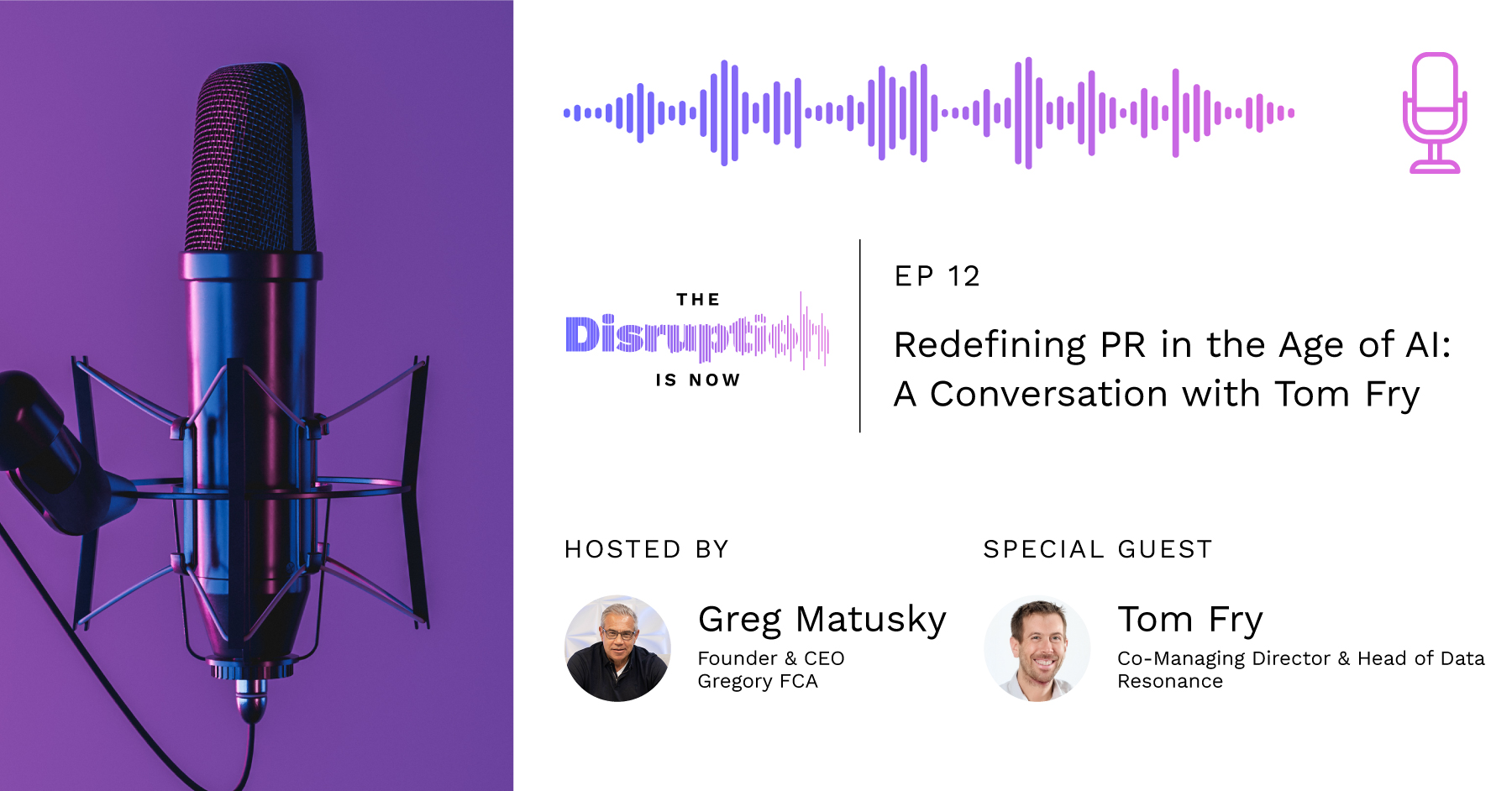The announcement of GPT-4 Turbo and custom GPTs opens a lot of new possibilities for PR. That’s according to Tom Fry, cofounder of Resonance PR and a technologist at heart — he studied engineering and computer science at the University of Cambridge.
Tom’s tech background gives him a unique vantage point on the ways AI is upending the communications and marketing industries and what we can expect in the months and years ahead.
For The Disruption Is Now, Tom talked to host Greg Matusky about the latest news in generative AI and its impact on public relations, as well as his thoughts on AI’s capabilities, the value of AI as a brainstorming assistant, and how the technology will transform everything from jobs to services in the PR industry.
Watch now:
Key takeaways:
The newest OpenAI product announcements are a big upgrade
OpenAI recently unveiled GPT-4 Turbo, which significantly expands the model’s context window and updates the base model knowledge to April 2023. The ability to customize GPTs also creates a lot of possibilities for PR.
Tom explains the significance in terms of electric cars. Up until now, ChatGPT was like the first Tesla — a powerful EV, but with a limited range. Now with a larger context window, ChatGPT has both power and range. The larger context window makes a difference when analyzing lengthy transcripts, writing longform content, and summarizing extensive research.
Commoditization looms for entry-level work
Greg and Tom both warn that AI threatens to imminently automate a great deal of routine PR agency work. This includes drafting basic press releases and media lists, writing formulaic pitches, conducting news monitoring, and reporting results.
As AI takes over these junior tasks, agencies will need to specialize in higher-value offerings around strategy, creativity, and relationship building.
At the same time, Greg sees value in junior employees using AI to quickly elevate their work without years of practice and training. It frees them from the more technical aspects of writing and allows them to focus more on the message than the language.
Relationships are one area where AI can’t help
Tom sees human relationships as one area that AI can’t automate, and cites that as one reason why automated pitches might fall flat. It’s invaluable for journalists to know which PR pros they can rely on to consistently deliver interesting story ideas or quote-worthy experts. The best pitch might be a single sentence referencing an expert both reporter and PR pro know — something ChatGPT won’t be able to generate.
Personalized, strategic communications and advice around sophisticated PR situations still depend on human emotional intelligence, judgment, and empathy. Despite the many recent advances, AI can’t quite replicate that work just yet.
Ideation and brainstorming gets an AI boost
Both Greg and Tom rate AI’s brainstorming assistance very highly. While AI may not independently drive breakthrough innovations, and many of its ideas will fall short, Greg always finds one or two interesting ideas among its suggestions.
AI’s ability to rapidly generate unconventional concepts and perspectives and make connections between disparate concepts could massively amplify human creativity and fill in blind spots any one person might have.
Key moments:
● Tom’s background as a technologist turned PR expert (4:13)
● How AI is impacting storytelling and PR agencies (5:55)
● What Tom thought of OpenAI’s DevDay announcements (8:48)
● Tom’s take on GPT-4 Turbo and what it means for communications (10:23)
● The first harbinger of autonomous agents (13:01)
● Generating a novel with ChatGPT (14:13)
● The future of custom GPTs in PR (17:37)
● AI for media list development (19:09)
● Greg and Tom cover the jagged edge of AI capabilities (21:56)
● Using generative AI for image creation (26:48)
● The first AI experiments at Gregory FCA (28:48)
● Greg’s first reaction to seeing generative AI and why he felt that way (32:52)


